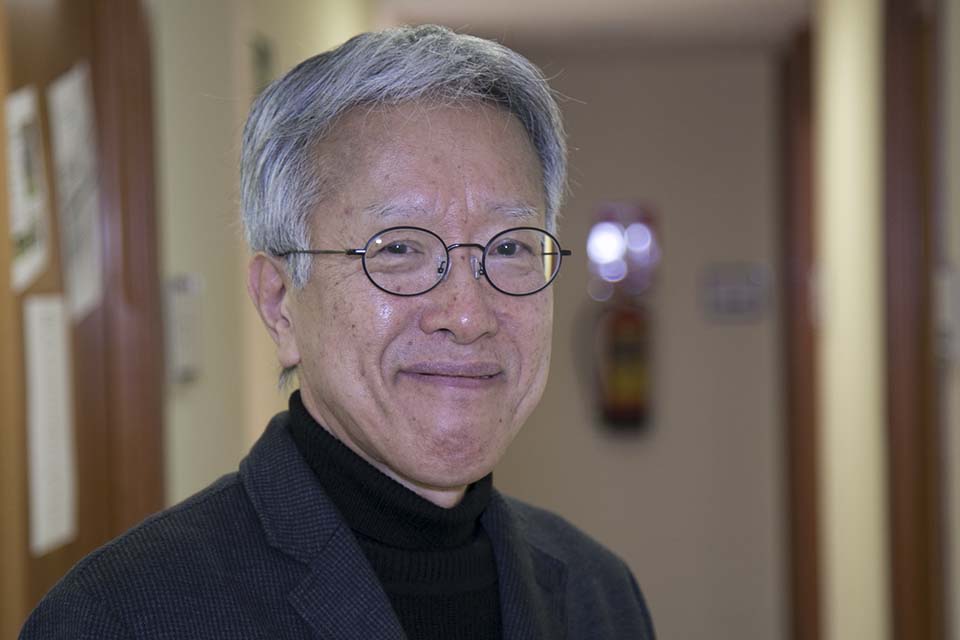An Interview with Japanese Anthropologist, Naoki Kasuga: “There is a shared intuitive component in the mathematician’s and the sorcerer’s ways of reasoning.”
Naoki Kasuga is a professor of cultural anthropology at Hitotsubashi University in Tokyo. He has carried out field research in Melanesia and contributed to the development of anthropological theory in Japan and beyond. He is the author of Anthropology as Critique of Reality (2012) where he embraces the so-called “ontological turn” in recent anthropology, according to which there are many worlds in our world, each one with its own ontology or reality, instead of a single world and different cultural interpretations of it.
Kasuga recently visited SLU-Madrid, where he had a chance to meet briefly with the director and academic dean, Paul Vita, Ph.D., and the chair of the division of humanities and social sciences, Mary Prendergast, Ph.D. He recorded the following interview with SLU-Madrid professor Carlos Segovia, Ph.D., who co-directs a research project on animist ontologies at Aarhus University and organized Kasuga’s visit to SLU-Madrid.
C.S.: What is the No. 1 issue in anthropology today?
N.K.: Probably the question about what reality is, which is also the question about where to start from when one studies another culture. How can I recognize and define a different ontology? Anthropologists say: “These people believe such and such.” We can check whether it is true that they do, and if the things in which they believe exist or not. But the anthropologist’s work is neither to describe what people believe in, nor is it to adapt their beliefs to her/his own ontology; it is to justify them by finding out which is their ontology: how is it that these people happen to believe such and such things? Which is the reality behind what I observe?
C.S.: This reminds me of an example I put to my Spanish doctoral students a couple of weeks ago at the University of Seville. If, I told them, we say that “The Yekuana believe the crimson-crested woodpecker to be their shaman,” we risk missing the point that such identification relies on an ontology which is not ours, as—for the Yekuana—bright-colored beings (like the crimson-crested woodpecker) and dynamic social roles (like that of the shaman) belong in the same ontological category. Therefore, their representation expresses not belief but conceptual classification.
N.K.: Right. We are told that the natural world is one thing, and the realm of cultural beliefs something else. And so anthropologists often take the beliefs they study as being anti-naturalistic. They generally try to provide an explanation of the type: these people believe such and such things out of fear of the unknown, etc. It is here that the “ontological turn” enters the picture: once we can see such and such representations can be reconciled with a different ontology, it all changes.
C.S.: This somehow goes beyond cultural relativism, since we are talking about different ontologies, i.e. about different realities altogether.
N.K.: Yes.
C.S.: The French philosopher Patrice Maniglier suggests in this sense that anthropology provides today a better model for the sciences than physics does, given its aptitude to critique reality (what is a priori?, what is empirical?, etc.). Do you agree?
N.K.: I do. But I would like to stress that the work of theoretical physicists and mathematicians presents a number of analogies with what anthropologists call magical thought. For instance, magical traps and scientific experimental devices, despite their many differences, work in similar ways. And there is a shared intuitive component in the mathematician’s and the sorcerer’s ways of reasoning.
C.S.: Let’s talk a little bit about you now. You moved into anthropology after reading Karl Polanyi, an economist. Claude Lévi-Strauss did it to be able to respond to a question formulated by Jean-Jacques Rousseau, who was in turn a philosopher. Would you encourage SLU-Madrid students to cultivate transversal concerns?
N.K.: Why not? I would especially encourage them to study anthropology!
C.S.: Your cross-reading of philosophers like Immanuel Kant, Gilles Deleuze, Martin Heidegger and Jacques Derrida in connection with the problem of the relations between subjectivity and time, and thereby to what you call the unexplored “delay” that inevitably influences our thinking (is it the “I” who is now thinking identical to the “I” who formerly thought?), provides a very fine example of intellectual transversality. In which ways can philosophy be useful to anthropology, and vice versa?
N.K.: Both disciplines are facing today similar issues, since an ontological turn is also affecting contemporary philosophy. But I am critical of those who depict their own work as ontology, like Quentin Meillassoux or Graham Harman.
C.S.: Their ontologies are rather flat if we compare them, for example, to those of Brian Massumi, Jane Bennett, and other vitalist materialists.
N.K.: I would say that even if they have an ability to communicate and a passion for clarity, which I like, the logic at play in their works is very limited: there is no room for the other logics whose influence is gaining ground today.
C.S.: I agree. Lastly, may I ask what is Naoki Kasuga working on right now?
N.K.: I am writing a new book on what I call the symmetrical ways of reasoning used in magical thought, so as to uncover the latter’s inner logic, which is also intimately linked to the notion of the infinite—and represents a very specific type of logic.
C.S.: Uncovering the logic, or we could say the grammar, of indigenous ways of thinking was not only Lucien Lévy-Bruhl’s major concern, but also that of Claude Lévi-Strauss in his latest works.
N.K.: Yes. But I feel there is still much to do in this respect.
C.S.: Thank you very much indeed for taking the time to talk about these fascinating issues, Naoki.
N.K. My pleasure!
